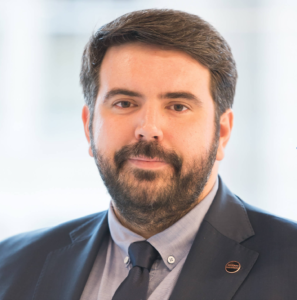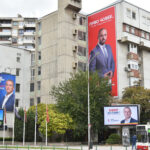In a space marked by weak institutions, unresolved identity issues, and the constant rivalry of authoritarian and democratic impulses, control over the media means control over all social processes. That is why the case of the United Media group and the crisis in which this network has found itself is much more than a matter of corporate business structure and commercial interests. The crisis of United Media is a story about the threat of a regional media blackout and about the possibility that the only serious pluralist voice in Serbia, and partly in the region, will be silenced under the pressure of an authoritarian regime.
United Media emerged in Serbia at the beginning of the 2000s, in the years after the fall of Slobodan Milošević, as an ambitious project with the help of Western capital. After its initial activities in the field of telecommunications and cable television infrastructure, UM began to build a professional media network that was meant to oppose the legacy of state control and open space for free and responsible journalism. In a relatively short time, this network transformed into a dominant regional media player, present in Slovenia, Croatia, Bosnia and Herzegovina, Bulgaria, and Montenegro. Particularly in Montenegro, United Media acquired the most popular and influential television channel and the newspaper Vijesti, thereby obtaining a role that no other media brand in the country has.
Although imperfect and at times contradictory, the media under the aegis of the United Media network played a significant positive and emancipatory role. This was especially visible in Serbia, where N1 and Nova S became almost the only serious opposition voice in an atmosphere of total media monopoly by the regime of Aleksandar Vučić. A former Minister of Information in the government of Slobodan Milošević, Vučić over the years grew into a leader who systematically and very successfully destroys media freedom, suppresses critical thinking, and builds a propaganda apparatus without precedent in the region and beyond. Yet the existence of N1 and Nova S was a reminder that total control over information was impossible. That is why their significance went beyond the media context and became a political issue of national and regional dimension.
The relationship of the United Media network to Montenegro was more complex. While Vijesti and its journalists in Podgorica remained a symbol of resistance to political pressure and a key pluralist voice, the reporting of N1 from Belgrade often carried ambiguous overtones. On the one hand, they sharply criticized the autocratic practice of power in Serbia, while on the other, they were indulgent or ignored the specific identity and political realities of Montenegro.
Aleksandar Vučić tolerated the critical work of the opposition media of the United Media group for a long time, being aware that their violent closure could provoke a negative reaction in the West, whose political and economic support he uses to legitimize his rule. Instead of a direct strike, he chose a more subtle approach. Through regulatory bodies that refused to grant national frequencies to N1 and Nova S, he restricted their reach. In parallel, tabloid campaigns were used to humiliate and persecute journalists, while pro-government television channels such as Pink and Happy filled the public space with cheap entertainment and propaganda programs.
However, after mass student protests in Belgrade, the regime felt that these critical media were becoming too serious a threat to power. At that moment Vučić applied one of his most subtle instruments — the state telecommunications company Telekom Srbija. This company transformed into an extension of the regime not only in the economic sphere but also in the propaganda war against the opposition in the country and as a means of spreading political influence in the region. Through Telekom and lucrative marketing deals, Vučić first corrupted many Serbian celebrities, turning them into propagandists of the regime. He also co-opted regional organizations and individuals through sponsorship contracts.
But the most recent example of the use of this institution, through its director by which he exerted pressure on the main owner of the United Media group — the investment fund BC Partners — with the demand to dismiss the leadership of N1 after the removal of founder and longtime leader Dragan Šolak, opened the space for direct interference of power in editorial policy.
Vučić’s strategy of subordinating the media isn’t news. He had already managed to co-opt the former opposition media elite and take over the symbols of former resistance to Milošević. Studio B and B92, once bastions of free journalism and symbols of democratic resistance of the 1990s, today are reduced to simple mouthpieces of propaganda. Tabloids such as Informer, Kurir, and Srpski telegraf have flooded kiosks and portals, becoming the main weapon for creating disinformation, incitement, and discrediting critics of the regime. Already in 2018, Twitter quite rightly labeled them state affiliated media, recognizing their role in spreading official state propaganda.
At the same time, the public space is saturated with reality shows, especially on the television channel Pink of Željko Mitrović, which create a culture of “infotainment,” where there is no room for serious political debate. Thus Vučić not only suffocates critical media, but also actively destroys the culture of responsible journalism, transforming the information industry into a tool of entertainment and control. The result is a society in which citizens live in a parallel reality shaped by sensationalism, fake news, and, what is even more interesting, pro-Russian narratives.
The cult political weekly NIN was recently co-opted when the entire editorial staff left the publication and created the weekly Radar, which also operates within the UM network. Politika, the oldest daily newspaper in the Balkans with a tradition of more than a hundred years, today serves as a channel for spreading Russian propaganda messages. These examples clearly show that the regime has no intention of tolerating professional standards when it comes to influential and recognizable media brands, but systematically transforms them into instruments of its own power.
The most dangerous form of this transformation today is taking place through the internationalization of propaganda. Telekom Srbija, as a state company, became the owner of the license for Euronews Srbija. On the surface, the presence of such a prestigious European brand in Belgrade could appear as proof of approaching European values. Yet the reality is diametrically opposite: Euronews Srbija operates under the umbrella of a company directly subordinated to an authoritarian regime.
What is especially alarming is that Telekom Srbija is now expanding this franchise to Montenegro and Bosnia and Herzegovina. Soon we will have a situation in which Euronews Crna Gora and Euronews BiH will operate as franchises of a European media brand but under the ownership of the state of Serbia. This means that a country long recognized as a destabilizing factor in the Balkans, a country where support for European Union membership is below 40 percent and which is ruled by an autocratic regime, becomes the bearer of a European media brand in two neighboring states.
This opens space for manipulations in which, through a brand perceived as European, in reality political narratives controlled from Belgrade are subtly promoted. In Montenegro and Bosnia and Herzegovina — societies already facing deep divisions and constant pressure on independent institutions — this means further destruction of trust in professional journalism and the transformation of public space into a battlefield of authoritarian narratives and Serbian nationalist interests. Instead of a neutral platform for informing, Euronews becomes an instrument of destabilization and undermining the European identity of these states.
A similar situation exists with other Western brands that Vučić’s regime uses as a mask to spread its influence. Bloomberg Adria and Newsmax Adria, which the regime indirectly controls, function as channels through which Belgrade projects its power and builds legitimacy in the eyes of the regional public. In this way Vučić skillfully plays a double game: in the West he presents himself as a pragmatic partner balancing between Moscow and Brussels, while inside Serbia he nurtures openly pro-Russian narratives and builds a system in which authoritarianism becomes the norm.
The essence of the entire problem lies precisely in this two-facedness of the regime. For the West Vučić appears as a guarantor of stability, a leader who controls “Russian influence” and keeps the region in balance. At the same time, inside Serbia all key pro-government media openly support Moscow, promote Russian views, and normalize anti-European narratives. Thus he manages at the same time to receive benefits from the West — through investments, political support, and licenses for prestigious media franchises — and from Russia, through the strengthening of nationalist and autocratic sentiments at home.
If the United Media network succumbs to pressure and loses its opposition character, Serbia will be left without a key pluralist voice, and the region without one of the few professional media systems. The consequences will be far-reaching: strengthening of authoritarian tendencies in Serbia, spread of propaganda narratives toward Bosnia and Herzegovina and Montenegro, further destruction of trust in independent media, and the strengthening of pro-Russian sentiments throughout the region. This would mean the final media blackout in the Balkans, in which instead of journalism there will exist only propaganda.
In this sense, the struggle for the media is a struggle for democracy. And the loss of this front would mean that the citizens of the region will be left in complete informational darkness, in which authoritarian power will have unlimited authority to shape reality.
Ljubomir Filipović. Montenegrin political scientist

The articles published in the “Opinions” column reflect the personal opinion of the author and may not coincide with the position of the Center



